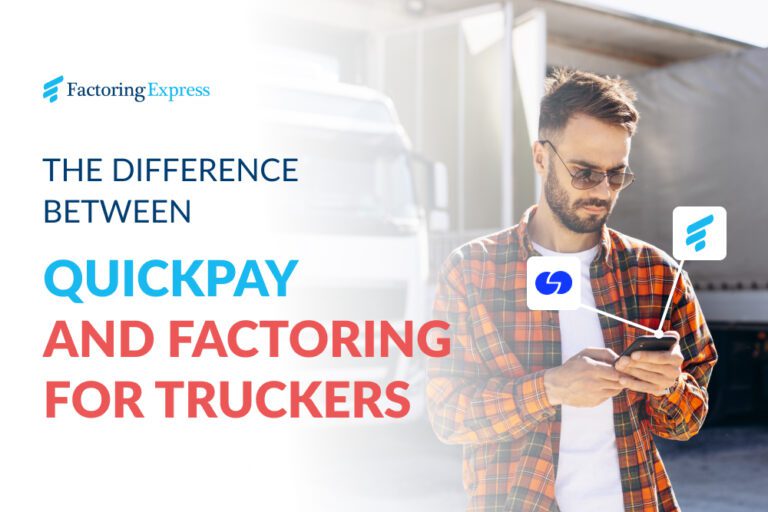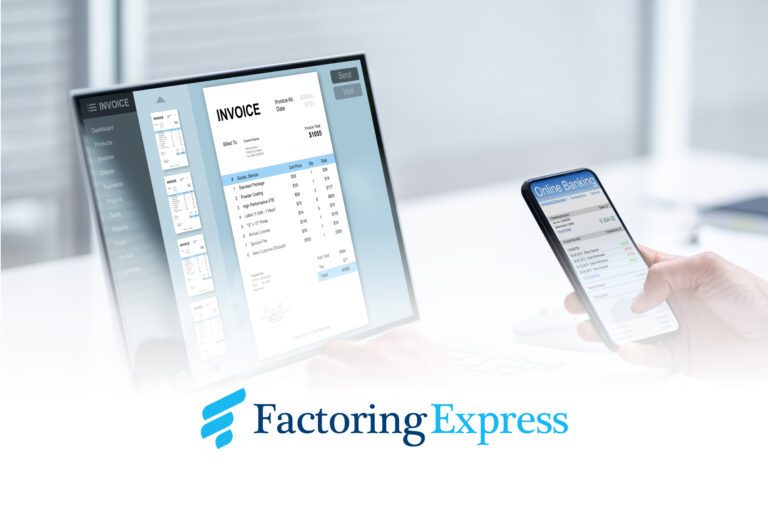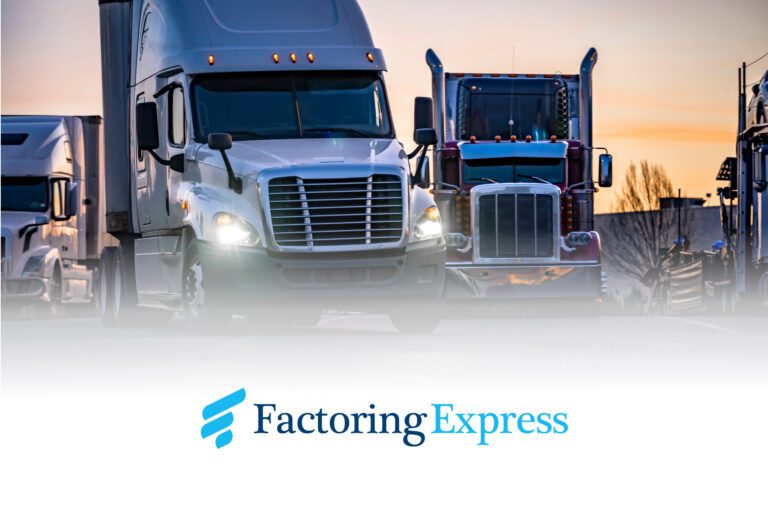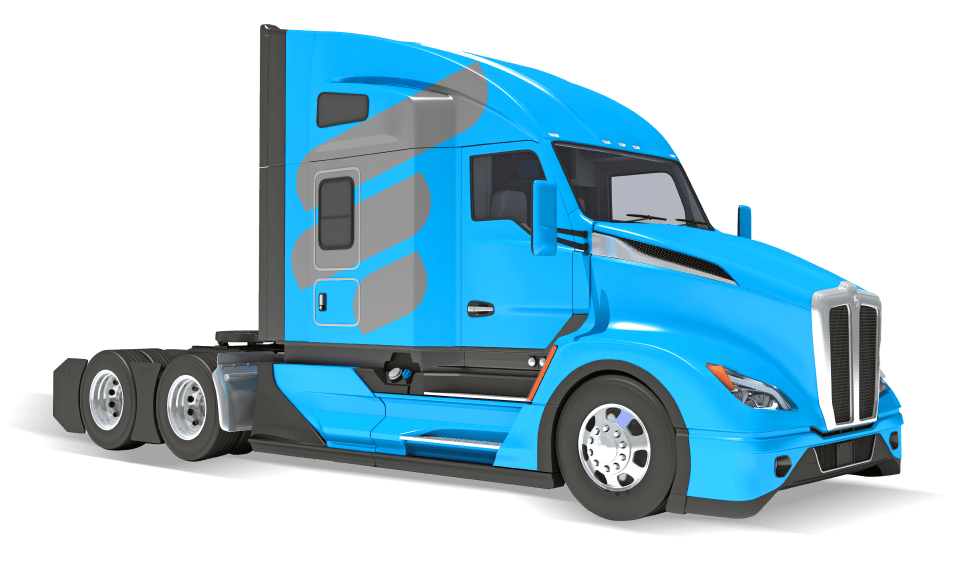You’ve got to keep your truck on the road and deliver those loads to keep earning. It’s not just repairs and fuel that keep you trucking, but also the means to pay for them.
In this article, we will help you find a way of getting your funds quicker by looking at quickpay vs factoring.
QuickPay and Freight Bill Factoring
Truckers are increasingly using QuickPay and freight bill factoring as payment options.
Freight factoring offers an alternative for processing and collecting load payments, while QuickPay helps keep trucks moving by giving truckers instant access to cash.
Trucking Companies Are Starting to Use QuickPay and Factoring
The recent hikes in driver pay are creating a challenging scenario for trucking companies. Small and medium trucking companies have experienced a cash flow crisis, forcing them to search for alternative financing options.
Increased fuel costs and other financial burdens mean that overheads are higher than ever, so invoices that could take up to 90 days to settle can cause financial stress.
Services like QuickPay for truckers and factoring help resolve these cash flow issues that many trucking companies are currently experiencing.
These services can assist by giving immediate access to monies that might otherwise take weeks or months to receive.
What Is Factoring?
Factoring enables companies to get paid in advance for invoices. Trucking companies, who frequently have to wait weeks or months for payment from their clients, will find this very helpful.
Trucking factoring, sometimes referred to as freight factoring, is the idea of selling an invoice to a third party in order to get paid more quickly and at a lower rate.
Factoring companies offer differing services and fees. According to ExpertMarket, a 0.5% to 5% fee seems to be the industry standard for load factoring.
Recourse Factoring
While fees are lower, the Factor offsets this by holding you liable if the client doesn’t settle the final bill.
Non-recourse Factoring
If the invoice isn’t fulfilled, non-recourse factoring shields the business from being required to pay back the factoring company. But on the other hand, the freight brokers’ percentage will be higher because they are taking on more risk.
What Is QuickPay?
With the help of a QuickPay payment service, invoices can be closed more quickly (2–5 days) and for a lower price (2–5% off).
Many shippers and brokers find this an appealing choice because it enables them to receive payment quickly. MHLNews estimates that the average invoice wait time is 30 to 60 days, so it is easy to see why cash advance options are in such demand.
Quickpay vs Factoring is often a choice between going with a broker that offers faster payment or a company that will buy your invoice. Before taking a load, do your homework because not all brokers allow Quick Pay.
Before making a choice, examine available possibilities because several shippers can offer comparable programs with longer payment terms and smaller discounts.
Each broker’s QuickPay terms, including costs and deadlines, are unique. Before registering for any programme, carefully read through these. Some brokers might also need more paperwork or documentation in order for you to be eligible for QuickPay.
In the end, Quick Pay can be a fantastic way to receive payments rapidly.
Payment Time
When it comes to the transportation sector, payment timing is crucial. Depending on the broker and the load paperwork filed, quick-pay payment periods might range from one to five days. You can submit documentation for loads and get payments within 2-4 business days.
Quickpay vs factoring time-scales can be slower as freight factoring businesses generally have a next-day payment service, but some even offer same-day payments.
Load Availability
Truckers may have trouble finding loads because certain brokers do not provide quick-pay solutions. Thankfully, freight factoring services enable a different approach and fast payment on most invoices.
The bottom line is that if you’re cash-strapped and can’t take on a load as the payment time is too far away, then you can work with a load factor.
Truckers can access higher-paying loads from virtually any broker while earning cash the following day by using a third-party agency to purchase unpaid invoices from carriers. Following delivery, factoring agents advance 80–95% of the load rate and pay the transporter the balance of the invoice amount when the client pays.
Benefits
Businesses can get paid promptly and effectively through factoring. It enables them to get paid for their bills without having to wait for the client to pay. With small firms that might not have the time or money to pursue unpaid clients, this might be extremely helpful.
Moreover, numerous factoring businesses provide additional services, including credit checks, collections, and accounts receivable management.
Quick pay trucking with the right broker can also get you access to those much-needed funds sooner than you’d expect. The main advantage is that there won’t be repercussions with unpaid invoices.
When looking into what percentage freight brokers charge, you might find that the right Quick Pay option-while slower-has less fees attached.
QuickPay vs Factoring - Which Do Truckers Prefer?
Drivers in the trucking sector have access to two financial services that can assist their cash flow: freight factoring and QuickPay.
In most cases, freight factoring is preferred over QuickPay because it has more advantages.
- Invoicing and collecting become the factor’s problem
- Client portals to keep track of your account
- You can decide which invoices to factor
QuickPay for truckers is helpful if you have a good relationship with your broker and a lot of long term work through them.
Which Payment Option Is Right For You?
Factoring comes with reserve difficulties but offers non-payment services like discount programmes and credit checks that are quicker to pay.
With QuickPay, you won’t face difficulties with recourse, reserve funds, or commitments to a specific volume of invoices. However, expect delayed payment. The trucker’s preferred choice will vary based on individual requirements such as payment deadlines and risk tolerance.
Factoring and QuickPay might be appealing alternatives to the protracted waiting periods involved with receiving payment for deliveries for carriers and Owner-Operators operating under their own authority.
With factoring, truckers can benefit from additional services like credit checks or discounts in addition to receiving cash more quickly. With QuickPay, there is swifter access to money with no strings attached is always a plus.
Final Thoughts
In conclusion, QuickPay vs Factoring is a question that only your needs can answer. But both are great options for truckers who need access to cash quickly. Just remember the differences before making your decision.
Ultimately, the best choice depends on factors such as your individual needs and risk tolerance. Be sure to do your research and consult professionals if needed. If you would benefit from quicker payment services, visit us at FactoringExpress.




